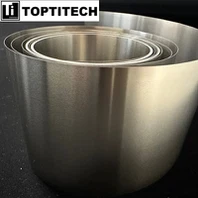 As the automotive industry strives for greater efficiency and environmental friendliness, titanium alloy, with its excellent performance, is emerging as the future choice for lightweighting and high performance in the automotive sector. Below, we will showcase the advantages of titanium alloy in the automotive industry through specific examples.
As the automotive industry strives for greater efficiency and environmental friendliness, titanium alloy, with its excellent performance, is emerging as the future choice for lightweighting and high performance in the automotive sector. Below, we will showcase the advantages of titanium alloy in the automotive industry through specific examples.
Lightweight Advantage of Titanium Alloy
Titanium alloy has a low density, approximately 60% of that of steel, while its strength is comparable to or even surpasses many alloy steels. This characteristic makes titanium alloy an ideal material for achieving vehicle lightweighting. For instance, in modern automobile manufacturing, using titanium alloy for manufacturing engine connecting rods can reduce the weight by 15% to 20% compared to steel rods. This lightweighting not only reduces the overall mass of the vehicle but also decreases fuel consumption, thereby improving fuel efficiency.
Heat Resistance and Corrosion Resistance of Titanium Alloy
Titanium alloy retains the required strength even at high temperatures and exhibits exceptional corrosion resistance. This gives titanium alloy a significant advantage in high-temperature and high-corrosion environments such as engines. For example, turbine rotor assemblies made of titanium alloy can operate in exhaust gases at temperatures above 850°C for extended periods without significant performance degradation. Additionally, when operating in humid atmospheres and seawater environments, titanium alloy demonstrates superior resistance to corrosion compared to stainless steel, effectively resisting pitting, acid attack, stress corrosion, and other forms of corrosion.
Examples of Titanium Alloy Applications
Engine Connecting Rods: The Ferrari 315LV8 model was one of the earliest cars to employ titanium alloy connecting rods. The lightweight design of these rods not only enhances the engine's power performance but also reduces fuel consumption and emissions.
Engine Valves: Titanium alloy engine valves are lighter and offer longer lifespan compared to steel valves. For instance, certain titanium alloy valves can reduce the mass by approximately 30% to 40% while improving the engine's maximum rotational speed by around 20%.
Vehicle Frame: Japanese automobile manufacturers utilize titanium alloy to construct vehicle body frames, reducing the weight of the vehicle and enhancing the driving experience. These frames not only possess high strength and good toughness but also exhibit excellent corrosion resistance.
Aerospace Industry: Titanium alloy finds extensive applications in the aerospace sector. For example, approximately 15% of the Boeing 787 Dreamliner's fuselage is made of titanium alloy, reducing the aircraft's overall weight and enhancing its flight performance and safety.




